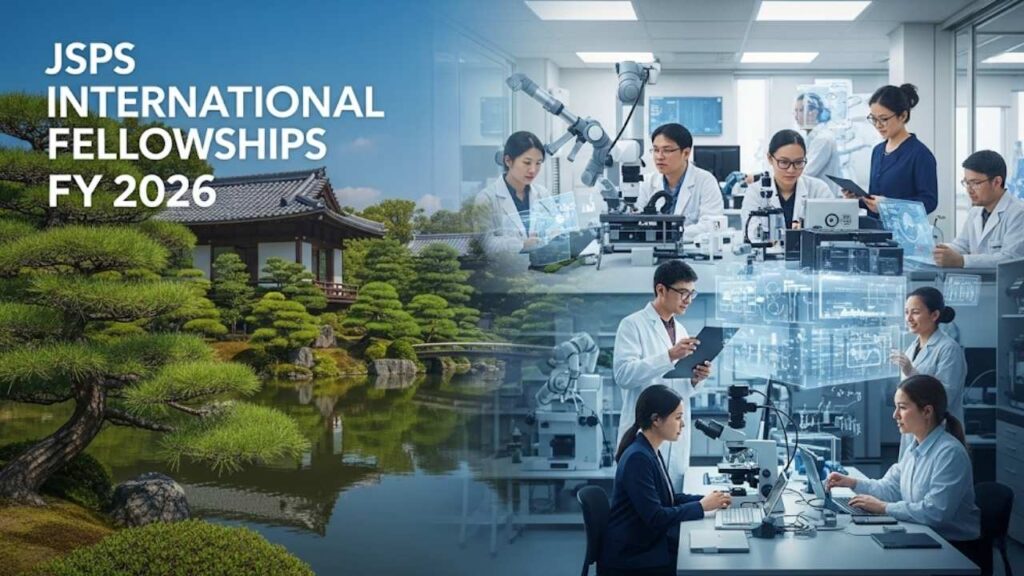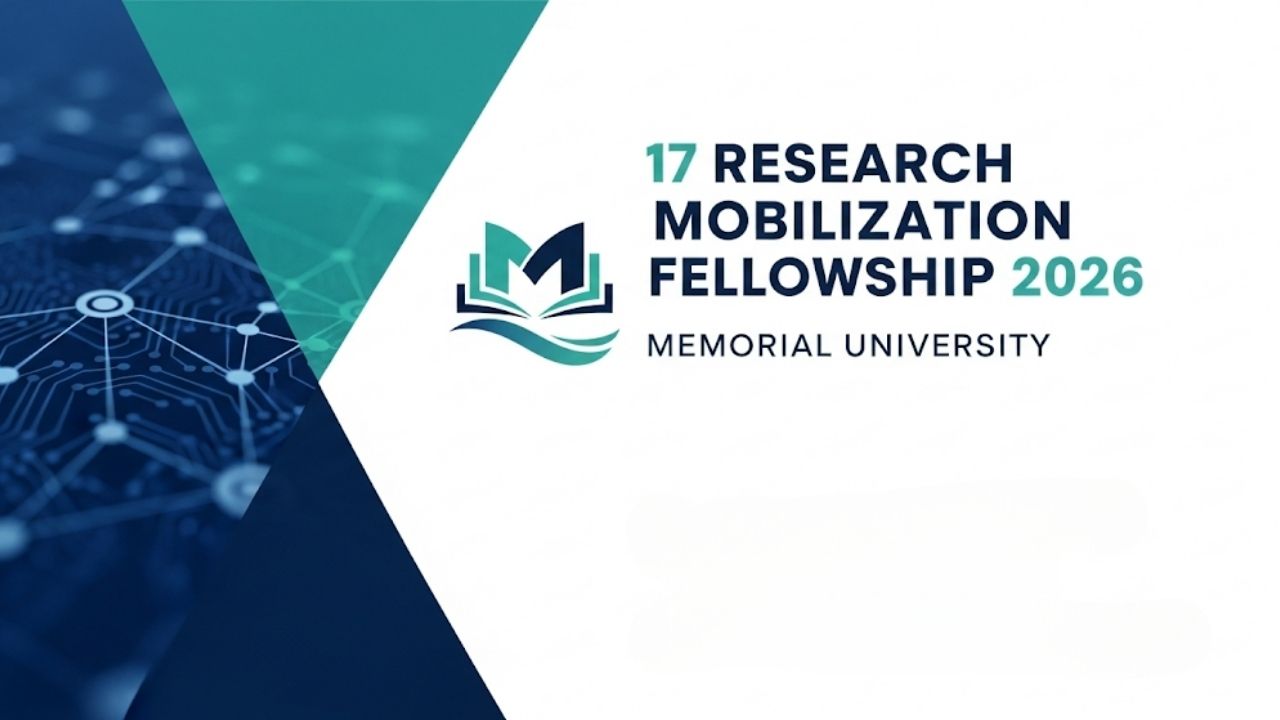Are you a bright, ambitious researcher with a vision for groundbreaking discoveries? Do you dream of immersing yourself in a vibrant academic culture, collaborating with world-renowned experts, and contributing to global scientific advancement? If so, the JSPS International Fellowships for FY 2026 could be your gateway to an extraordinary research journey in Japan. This fully funded program, offered by the Japan Society for the Promotion of Science (JSPS), is a golden opportunity for pre- and postdoctoral researchers worldwide to elevate their careers and make a significant impact.

As someone who has advised many aspiring international scholars, I understand the mix of excitement and apprehension that comes with applying for such a prestigious fellowship. The good news is, with the right information, a clear strategy, and a dash of perseverance, navigating the JSPS application process can be a highly rewarding experience. This article will provide you with comprehensive, actionable, and encouraging insights to help you successfully embark on this exciting path.
Understanding the JSPS International Fellowships: Your Passport to Japanese Academia
The Japan Society for the Promotion of Science (JSPS) is Japan’s leading independent administrative institution for promoting science, largely funded by the Japanese Ministry of Education, Culture, Sports, Science and Technology (MEXT). Since its establishment in 1932, JSPS has been at the forefront of fostering academic research across all disciplines, from the humanities and social sciences to natural sciences and engineering. The International Fellowship program is one of its most prominent initiatives, designed to invite highly qualified international researchers to Japan to conduct collaborative research with leading Japanese scholars and institutions.
JSPS International Fellowships at a Glance
| Key Fact | Detail/Statistic |
| Program Types | Standard (12-24 months) and Short-term (1-12 months), including specific tracks for different regions (e.g., ASEAN, US, Canada, Europe). JSPS Official Website |
| Eligibility | Generally, non-Japanese citizens with diplomatic relations with Japan, holding a PhD within six years of the fellowship start date, or doctoral candidates expected to receive their PhD within two years. Specific variations exist for different program types and nominating authorities. |
| Financial Support | Monthly stipend (e.g., ¥362,000 for PhD holders, ¥200,000 for doctoral candidates), round-trip airfare, settling-in allowance (¥200,000 for stays ≥3 months), and research support. SSRC/JSPS Fellowship Program |
| Application Method | Primarily through a host researcher at a Japanese university/research institution. Some countries have nominating authorities. |
| Application Deadline | Varies by program type and nominating authority. For the FY2026 Standard Program (1st Call), the deadline to JSPS Tokyo via host institution is often around August 29, 2025. Host institutions set earlier internal deadlines. |
The JSPS International Fellowships for FY 2026 represent a remarkable opportunity for ambitious researchers to conduct cutting-edge studies in Japan. It’s a chance to expand your scientific horizons, forge invaluable international connections, and experience a unique culture. While the application process demands diligence and strategic planning, the rewards are immeasurable.
Who Can Apply? Eligibility at a Glance
The JSPS International Fellowships are highly competitive, designed to attract outstanding researchers with significant potential. While specific eligibility criteria can vary slightly between program types (Standard, Short-term, etc.) and nominating authorities (like The British Academy or SSRC), some core requirements are generally consistent:
- Nationality: You must be a citizen of a country that has diplomatic relations with Japan. (JSPS typically treats Taiwanese and Palestinian researchers in this manner). Japanese citizens and those with permanent residency in Japan are generally not eligible for these international fellowships.
- Academic Degree:
- Postdoctoral Fellows: You should typically have obtained your doctoral degree within six years of the fellowship’s effective date. Some allowances may be made for maternity/paternity leave.
- Doctoral Candidates: If you are currently enrolled in a doctoral course outside Japan, you may be eligible if you are scheduled to receive your PhD within two years from the start of your research in Japan.
- Research Affiliation (for some programs): For certain short-term programs, you may need to have been engaged in research continuously for at least three years at a university or research institution in an eligible country.
- Host Researcher: A crucial element of your application is securing a host researcher at a Japanese university or research institution. This researcher must be willing to accept and supervise you throughout your fellowship tenure.
Your Japan’s JSPS International Fellowships for FY 2026 Guide
The JSPS application process, while comprehensive, is designed to ensure that the most promising candidates are identified. It typically involves a collaboration between you and your prospective host researcher in Japan.
1. Finding Your Ideal Host Researcher: The Cornerstone of Your Application
This is arguably the most critical step. Your host researcher will be your mentor, collaborator, and the conduit for your application to JSPS.
I’ve seen many successful applicants focus on identifying a host researcher whose work aligns perfectly with their research interests and who can provide the necessary resources and intellectual environment.
- Networking: Leverage your academic network. Attend conferences, review recent publications in your field, and reach out to researchers whose work you admire.
- Direct Approach: Once you identify potential hosts, craft a concise and compelling email. Introduce yourself, highlight your research background, and clearly articulate how your proposed research aligns with their ongoing work. Attach your CV and a brief research proposal.
- Mutual Fit: The relationship with your host is a partnership. Ensure there’s a genuine mutual interest in the research project and a good working dynamic.

2. Crafting a Winning Research Proposal: Your Academic Blueprint
Your research proposal is where your scientific vision truly shines. It should be clear, concise, and compelling, demonstrating the originality, academic significance, and feasibility of your proposed work.
- Background and Purpose: Clearly outline the scientific background, identify the existing gaps in knowledge, and state the specific purpose of your research. What problem are you trying to solve, or what new insights will you uncover?
- Research Plan and Methods: Detail your methodology. How will you achieve your research objectives? Be specific about the experimental design, data collection, and analytical techniques.
- Originality and Impact: This is key! Emphasize the unique aspects of your research and its potential to contribute significantly to your field and society. JSPS seeks independent thinkers.
- Feasibility and Timeline: Present a realistic timeline for your project. Demonstrate that your research is achievable within the fellowship duration, considering the resources available at your host institution.
- Publications: Include a comprehensive list of your major publications. Peer-reviewed articles, especially in international journals, will significantly strengthen your application.
3. Assembling Your Application Documents: Precision is Key
The JSPS application forms require meticulous attention to detail. Ensure all fields are accurately completed and that supporting documents are correctly formatted.
- Application Forms (Form 1, Form 2): These forms gather your personal details, academic background, research experience, and the specifics of your proposed research.
- Letter of Acceptance/Invitation: A formal letter from your prospective host researcher in Japan, confirming their willingness to host you and support your research.
- Letter of Recommendation: Typically from your doctoral supervisor or another academic who can speak to your research abilities and potential. This person should be different from your host researcher.
- Doctoral Degree Certificate/Proof: A copy of your PhD diploma or a certificate stating the expected award date if you haven’t received it yet.
- Academic Transcripts: For some programs, a record of your higher education.
- Proof of Language Ability: While Japanese language skills are not always mandatory, a good command of English is essential. For humanities and social science scholars, some Japanese knowledge might be necessary depending on the research.

4. Submission: Through Your Host Institution
Unlike many direct scholarship applications, the JSPS International Fellowship applications are generally submitted by your host institution in Japan to JSPS. This means your host researcher will play a vital role in ensuring your application is complete and submitted by the internal and external deadlines.
Life as a JSPS Fellow: Beyond the Lab
The JSPS fellowship offers more than just financial and academic support; it provides a unique cultural immersion. Japan is a country where ancient traditions seamlessly blend with cutting-edge technology, offering a rich environment for both personal and professional growth.
The Essential Guide to International Fellowships 2025, University of Brighton
The Commonwealth Startup Fellowship Opens for Applications on June 2, 2025!
FAQ
Q1: What is the typical duration of JSPS International Fellowships?
A: The JSPS International Fellowships offer various durations. The “Standard” program typically ranges from 12 to 24 months, while “Short-term” programs can be from 1 to 12 months.
Q2: Do I need to know Japanese to apply for the JSPS Fellowship?
A: While Japanese language skills are not always a mandatory requirement, especially for natural sciences, a good command of English is essential. For research in humanities and social sciences, or if your research involves extensive interaction with Japanese communities, some level of Japanese proficiency may be highly beneficial or even necessary.
Q3: Can Japanese citizens or permanent residents of Japan apply for these international fellowships?
A: No, the JSPS International Fellowships are specifically designed for researchers who are not Japanese citizens and do not hold permanent residency in Japan.
Q4: How do I find a host researcher in Japan?
A: Finding a host researcher can be done through various avenues, including networking at conferences, exploring publications by Japanese researchers in your field, reaching out to your academic mentors for connections, or directly contacting faculty members at Japanese universities whose research aligns with yours.
Q5: What financial support does the JSPS International Fellowship provide?
A: The fellowship generally includes a monthly stipend (e.g., ¥362,000 for PhD holders), a round-trip air ticket, a settling-in allowance (¥200,000 for stays of three months or more), and support for research-related expenses, which are often applied for by the host institution.










